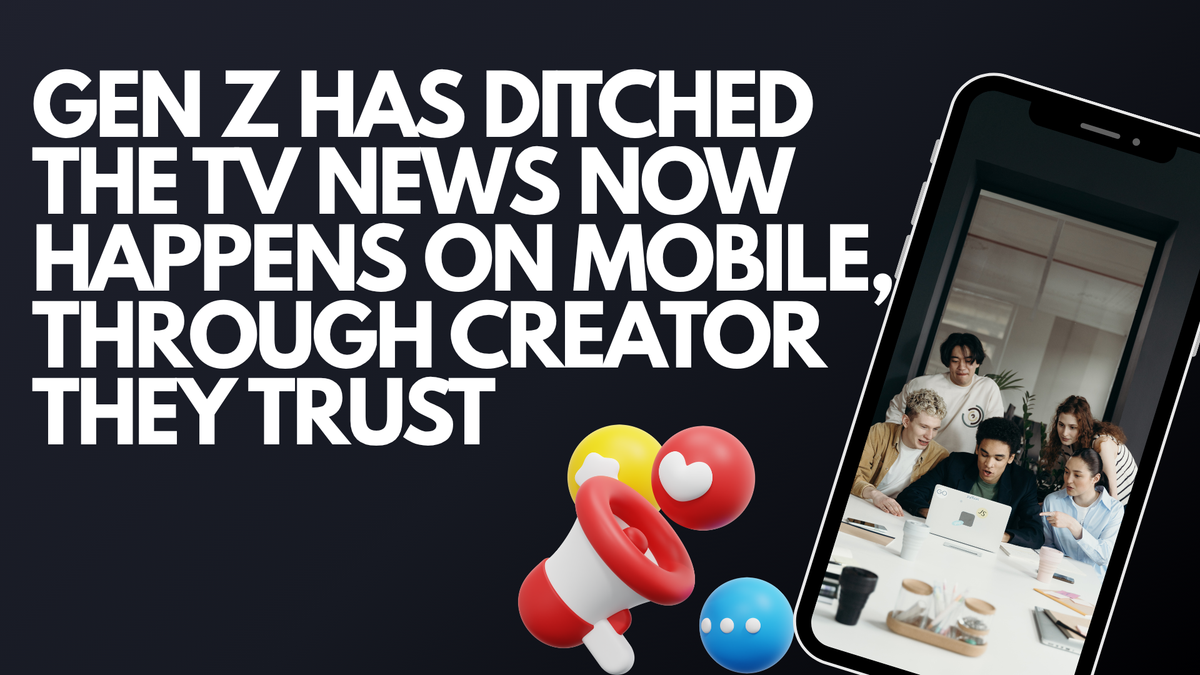Why Gen Z Doesn’t Trust the Media in 2025 and What They’re Watching Instead
Gen Z is ditching legacy media in favor of commentary YouTubers, FOIA-leaking Tik Tokers, and alt-news platforms. With distrust at an all-time high, they now turn to creators who show their receipts and cite CourtListener, Justia, and Archive.org.

New York, July 1, 2025
It's 2025, and an internet-born generation is remaking the playbook of who gets to cover the news. Gen Z doesn't believe in the old media—and they're outspoken about it. From viral TikTok videos exposing fact-checking news segments to Reddit posts picking apart mainstream media manipulation, it's a full-on information revolution.
But if they've tuned out CNN, Fox, and even NPR… what are they watching in their place?
Let's dismantle the media trust crisis, the emergence of commentary YouTube, and the alt-news sites Gen Z uses to get real talk.
Why Gen Z Doesn't Trust the Media in 2025
1. Mistrust Built on Decades of Spin
The distrust wasn't an overnight thing. It was constructed on decades of:
- Sensationalism under Trump and Biden.
- COVID-19 misinformation pandemonium (on both sides).
- Corporate ownership conflict of interest.
As of a 2025 Pew Research Center report, just 22% of Gen Zers indicate that they trust traditional news organizations to report the truth, down from 37% of Millennials and 58% of Boomers.
They're not only doubters they're digitally disconnecting.
"You can't tell me a billionaire-owned media outlet is reporting the news objectively," says Aanya, 23, a political TikToker from Austin.
2. The Overuse of "Breaking News"
From climate news to celebrity arrests, all was "breaking." And Gen Z? They took notice.
Google Trends reveals drops in searches for 'breaking news' among ages 18-26 since 2023. What's trending instead? "explained," "fact-checked," and "uncut." They don't need 90-second re-tellings. They need context, nuance, and receipts.
3. Censorship, Bias, and Corporate Control
2023-2024 was full of media scandals:
- Newsroom leaked emails (see Archive.org) revealed political story suppression.
- Major lawsuits over biased reporting were filed (see Justia).
- CourtListener archives reveal internal communications in Doe v. NewsCorp highlighting pressure from advertisers to kill anti-pharma stories.
Gen Z’s response? “We’ll find it ourselves.”
So, What Are They Watching Instead?
1. Commentary YouTube: The New Newsroom
Creators like HasanAbi, ContraPoints, FD Signifier, and Breaking Points aren’t journalists by training—but that’s exactly why Gen Z trusts them.
Why it works:
- Longform discussions
- Real-time reaction to events
- Authentic, unfiltered opinions
- No ad-revenue-driven scripts
A 2024 report from Tubefilter discovered that:
"60% of Gen Z aged 18–25 say they get more value from commentary YouTube than cable news."
And it's not only about politics. Shows like LegalEagle, More Perfect Union, and ColdFusion offer commentary on legal wars, worker struggles, and international affairs with sources listed live on screen.
2. Alt-News Platforms: Bolder, Smaller, Sharper
Platforms such as:
- The Grayzone
- Substack newsletters (Matt Taibbi, Glenn Greenwald)
- AllegedlyNewsNetwork.com (???? That's us)
- Independent TikTok News Rooms like @breakingpointsdaily
These aren’t neutral platforms. But Gen Z isn’t looking for “neutral” anymore—they want transparent.
“I’d rather watch someone who says what they believe than pretend to be ‘objective’ and lie about it,” notes a viral Reddit post in r/GenZPolitics.
Case Study: Coverage of the Trump Trials
During the State of New York v. Donald J. Trump case (see CourtListener Docket), cable news rotated between:
- Sensationalized headlines
- Useless expert panels
- Repetitive footage
Meanwhile:
- YouTube vloggers streamed live court analysis.
- TikTok legal explainers got more views than 50M in 3 days.
- Independent reporters released searchable court records and plain-English explanations (sourced through Justia).
Gen Z didn't wait for CNN went and watched the trial docket themselves.
Information Decoded: Memes > Mainstream
Gen Z has learned media literacy from memes, not from journalism school. When MSNBC cuts out chants during protests, Gen Z shares the entire video. When Fox broadcasts fear-mongering, TikTok stitches reveal it in hours.
Sites like Archive.org and Reddit's OutOfTheLoop enable them to follow deleted stories, buried leads, and fudged quotes.
Their slogan?
"Don't tell me what happened. Show me."
The 5 Traits Gen Z Wants in News
- Unfiltered access to primary materials (dockets, raw footage, emails)
- Commentary by humans, not institutions
- Entertainment with analysis (yes, memes qualify)
- Interactive formats (chat reactions, polls, AMAs)
- Brutal transparency (affiliations, funding, agenda)
What Legacy Media Got Dead Wrong
In 2025, Gen Z expects you to:
- Admit your bias.
- Cite your sources.
- Engage in dialogue, not dictate the truth.
Future Forecast: The Rise of Creator-Journalists
In 2025, we’re seeing a shift to a creator-led news ecosystem where TikTokers, podcasters, and Substack writers are more trusted than traditional anchors.
They’re not perfect but they cite sources, show receipts, and engage directly with their audiences.
Expect powerful hybrids like:
- YouTube + CourtListener dockets
- TikTok explainers + Reddit fact threads
Podcasts backed by Archive.org evidence
Gen Z’s new newsroom is interactive, transparent, and creator-driven.
What This Means for Democracy
This isn’t just about preferences. It’s about power.
If Gen Z keeps depending on alt-sources, legacy media will lose control of elections, public opinion, and legislation.
Already, 2024 demonstrated:
- TikTok's impact on young voter turnout
- Commentary videos impacting Supreme Court public opinion
- Independent reporting of Middle East and student protests that changed the national conversation
The war of truth is not CNN vs. Fox. It's TikTok vs. Everything Else.
Legacy Media vs. Gen Z’s New News: A Side-by-Side Comparison
As Gen Z reshapes the media landscape, the contrast between old-school journalism and modern digital commentary is stark.
Gen Z’s media diet reflects distrust of gatekeepers and preference for transparency and direct access to source material.
They aren’t rejecting journalism—they’re demanding better journalism:
- More accountability
- More participation
- More human voices
Whistle blowers & Leaked Docs: The New Celebrity Reporters
Another reason Gen Z distrusts the media? Because the most important stories in the last decade didn’t come from newsrooms—they came from leaks.
From Edward Snowden to Frances Haugen (Facebook Papers) to the Supreme Court leak on Roe v. Wade, Gen Z learned early that truth often comes from inside, not the top.
And in 2025, this trend is accelerating.
Sources They Watch:
- CourtListener for sealed court case updates, including whistleblower dockets.
- Archive.org for deleted posts, removed videos, takedown notices.
- Substack for anonymous whistleblower interviews (see “Inside Amazon’s AI Warehouse” exposé, May 2025).
Conclusion: Gen Z Isn't Misinformed—They're Misled
The "misinformed" Gen Z narrative is old and elitist. The fact is, they're more resourceful, critical, and networked than any previous generation.
They can:
- Watch a court case from the source.
- Cross-reference headlines against open data.
- Expose media manipulation in real time.
And they've created a ecosystem of Substack journalists, commentary YouTubers, court archives, and TikTok explainers that's redefining the way truth spreads.
Old media isn't just becoming less relevant it's losing the war for trust.
SOURCES:
- CourtListener.com
- Justia.com
- Archive.org
- Pew Research Center: Trust in News 2025
- Google Trends - "Breaking News" vs. "Explained" (2023-2025)
- Tubefilter Gen Z YouTube Stats 2024
- [Newsweek, Reuters, NPR Official Releases]
For more legal exposes and truth-behind-glamour stories, subscribe to AllegedlyNewsNetwork.com




